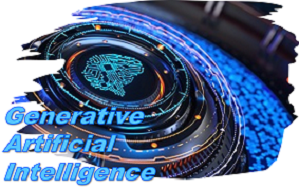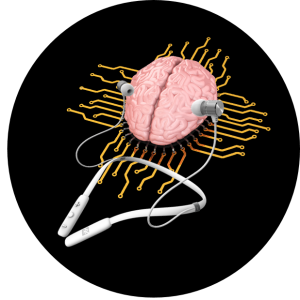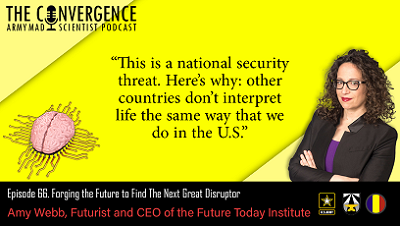[Editor’s Note: Army Mad Scientist is pleased to present our latest episode of The Convergence podcast, featuring a provocative conversation with Amy Webb, futurist, author, and founder and CEO of the Future Today Institute, addressing strategic foresight, emerging technologies like synthetic biology, and what she sees as vital implications for the U.S. Army — Enjoy!]
[If the podcast dashboard is not rendering correctly for you, please click here to listen to the podcast.]
 Amy Webb advises Chief eXperience Officers (CXOs) of the world’s most-admired companies, three-star admirals and generals, and the senior leadership of central banks and intergovernmental organizations. Founder of the Future Today Institute, a leading foresight and strategy firm that helps leaders and their organizations prepare for complex futures, Amy pioneered a data-driven, technology-led foresight methodology that is now used within hundreds of organizations. Forbes called Amy “one of the five women changing the world.” She was honored as one of the BBC’s 100 Women of 2020 and is ranked on the Thinkers50 list of the 50 most influential management thinkers globally. Amy is the best-selling author of several books. Her latest book, The Genesis Machine (PublicAffairs / Hachette 2022) examines the futures of gene editing, biotech, and synthetic biology. Synthetic biology is the promising and controversial technology platform that combines biology and artificial intelligence, opening up the potential to program biological systems much as we program computers.
Amy Webb advises Chief eXperience Officers (CXOs) of the world’s most-admired companies, three-star admirals and generals, and the senior leadership of central banks and intergovernmental organizations. Founder of the Future Today Institute, a leading foresight and strategy firm that helps leaders and their organizations prepare for complex futures, Amy pioneered a data-driven, technology-led foresight methodology that is now used within hundreds of organizations. Forbes called Amy “one of the five women changing the world.” She was honored as one of the BBC’s 100 Women of 2020 and is ranked on the Thinkers50 list of the 50 most influential management thinkers globally. Amy is the best-selling author of several books. Her latest book, The Genesis Machine (PublicAffairs / Hachette 2022) examines the futures of gene editing, biotech, and synthetic biology. Synthetic biology is the promising and controversial technology platform that combines biology and artificial intelligence, opening up the potential to program biological systems much as we program computers.
In today’s podcast, we talk with Amy about strategic foresight, emerging technologies like synthetic biology, and what she sees as vital implications for the U.S. Army. The following bullet points highlight key insights from our interview:
-
-
- There are always three stages of work, whether in government or private sector, when it comes to foresight: Inputs (forces, signals, and trends), outcomes (scenarios describing plausible futures), and some form of action or backcasting (reverse engineering a preferred future).
-
-
-
- Synthetic or engineered biology consists of modifying or manipulating biological code to give it new or enhanced purposes. In the “read, edit, write” analogy, synthetic biology gives the user the
 “write” function to make sweeping changes with more control. This is not limited to human biology as it can be applied to plants, viruses, and any other biological material.
“write” function to make sweeping changes with more control. This is not limited to human biology as it can be applied to plants, viruses, and any other biological material.
- Synthetic or engineered biology consists of modifying or manipulating biological code to give it new or enhanced purposes. In the “read, edit, write” analogy, synthetic biology gives the user the
-
-
-
- Access to synthetic or designer biology may create a new class of genetic haves and have-nots. Wealth will be a restricting factor, but religious beliefs may also prove to be less tolerant of these manipulations and changes, thus hard-coding specific social values into the DNA of the future.
-
-
-
 Policy and regulation do not adequately address the synthetic biology issue in a cohesive way. In some countries, genetic screening for certain types of diseases is employed, but it is generally unfavorable to screen for attributes that correlate to higher intelligence. However, in some countries it is not illegal, and there are commercial entities offering to screen for cognitive ability.
Policy and regulation do not adequately address the synthetic biology issue in a cohesive way. In some countries, genetic screening for certain types of diseases is employed, but it is generally unfavorable to screen for attributes that correlate to higher intelligence. However, in some countries it is not illegal, and there are commercial entities offering to screen for cognitive ability.
-
-
-
- There are many implications borne out of a democratization of synthetic biology technology that will affect the U.S. Army in the future. Researchers are developing a device similar in size to a mobile phone that, in a battlefield environment, could screen for and sequence a novel pathogen. This will allow Soldiers to identify which genetic material and re-agents to use as an antidote or mix for a vaccine in the field. This could potentially increase battlefield readiness.
-
-
-
- The brain-machine computer known as “dishbrain”– containing human cells — was able to learn the video game “pong” more quickly than any artificial intelligence ever. In the future, this type of
 technology could be used for hyper-real time, high-frequency strategy creation by the Army or, conversely, an adversary.
technology could be used for hyper-real time, high-frequency strategy creation by the Army or, conversely, an adversary.
- The brain-machine computer known as “dishbrain”– containing human cells — was able to learn the video game “pong” more quickly than any artificial intelligence ever. In the future, this type of
-
-
-
- The ethical considerations for “dishbrain” must also be taken into account. Would it be considered a war-crime to torture an organic entity that’s not, by definition, a human? Will our adversaries come to the same conclusion as the U.S., or will we be disadvantaged by an asymmetry in ethics?
-
-
-
- Generative Artificial Intelligence is the next big societal disruptor. New open-source tools are scraping publicly available information for content, data, and potential decisions for investors
 . It could also be used to amplify misinformation and allow a foreign actor to sow distrust in a way that is harder to detect and more effective overall.
. It could also be used to amplify misinformation and allow a foreign actor to sow distrust in a way that is harder to detect and more effective overall.
- Generative Artificial Intelligence is the next big societal disruptor. New open-source tools are scraping publicly available information for content, data, and potential decisions for investors
-

Stay tuned to the Mad Scientist Laboratory for our next episode of The Convergence — featuring Force Multiplier innovators from this year’s on-going Fed Supernova conference in Austin, Texas — coming to you on 13 October 2022!
If you enjoyed this podcast, check out the following related content:
Cyborg Soldier 2050: Human/Machine Fusion and the Implications for the Future of the DOD, and the comprehensive report from which it was sourced
The Last Frontier, by PFC Peter Brenner
Linking Brains to Machines, and Use of Neurotechnology to the Cultural and Ethical Perspectives of the Current Global Stage, by Mr. Joseph DeFranco and Dr. James Giordano.
China’s Brain Trust: Will the U.S. Have the Nerve to Compete? by Mr. Joseph DeFranco, CAPT (USN – Ret.) L. R. Bremseth, and Dr. James Giordano
Disrupting the “Chinese Dream” – Eight Insights on how to win the Competition with China
Connected Warfare by COL James K. Greer (USA-Ret.)
Benefits, Vulnerabilities, and the Ethics of Soldier Enhancement
Proclaimed Mad Scientist Dr. James Giordano‘s presentation and video on Neurotechnology in National Security and Defense, from the Mad Scientist Visioning Multi Domain Battle in 2030-2050 Conference, at Georgetown University in Washington, DC, on 25 & 26 July 2017; and his Neuroscience and the Weapons of War podcast, hosted by our colleagues at Modern War Institute (MWI), 2 August 2017
Top Ten Bio Convergence Trends Impacting the Future Operational Environment, Bio Convergence and Soldier 2050 Conference Final Report, and the comprehensive Final Report from the Mad Scientist Bio Convergence and Soldier 2050 Conference with SRI International at their Menlo Park campus in California on 8–9 March 2018
Ethics and the Future of War panel discussion, facilitated by proclaimed Mad Scientist LTG Jim Dubik (USA-Ret.) from the Mad Scientist Visualizing Multi Domain Battle in 2030-2050 Conference at Georgetown University, Washington, D.C. on 25-26 July 2017
Weaponized Information: What We’ve Learned So Far… and Insights from the Mad Scientist Weaponized Information Series of Virtual Events
The Exploitation of our Biases through Improved Technology, by proclaimed Mad Scientist Raechel Melling
SAVE THE DATE: Join Army Mad Scientist and the National Museum of the United States Army (NMUSA) for the Back to the Future: Using History to Forecast conference on 08-09 November 2022, at Fort Belvoir, Virginia. This event will feature world-renowned expert speakers and panelists from  industry, tech, academia, and the U.S. military and other government agencies discussing how history and experience inform and shape our future thinking and decision-making on critical issues. These historians, futurists, and thought leaders will converge backcasting with futurecasting to provide penetrating insights on Army people, materiel, readiness, and doctrine and concepts initiatives. Stay tuned to the Mad Scientist Laboratory for more information on our first in-person conference since 2019!
industry, tech, academia, and the U.S. military and other government agencies discussing how history and experience inform and shape our future thinking and decision-making on critical issues. These historians, futurists, and thought leaders will converge backcasting with futurecasting to provide penetrating insights on Army people, materiel, readiness, and doctrine and concepts initiatives. Stay tuned to the Mad Scientist Laboratory for more information on our first in-person conference since 2019!
Disclaimer: The views expressed in this blog post do not necessarily reflect those of the Department of Defense, Department of the Army, Army Futures Command (AFC), or Training and Doctrine Command (TRADOC).



